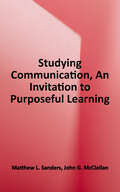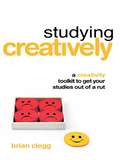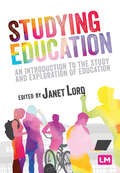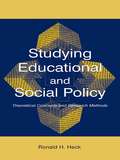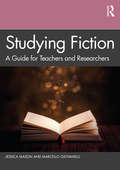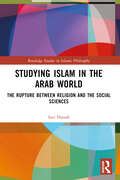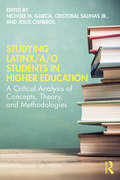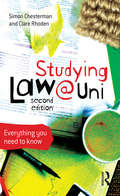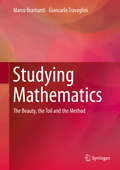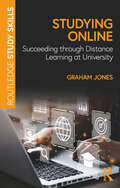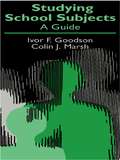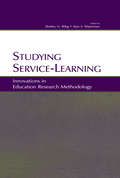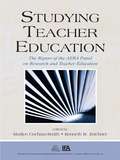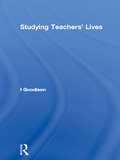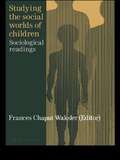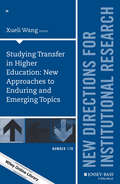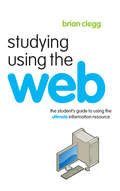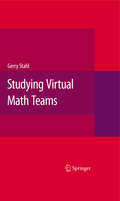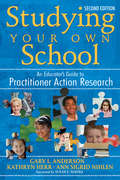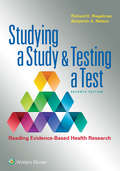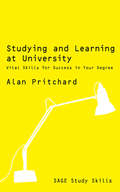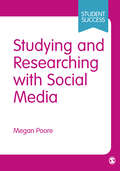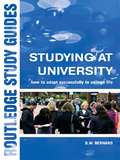- Table View
- List View
Studying Communication: An Invitation to Purposeful Learning
by Matthew L. Sanders John G. McClellan"Throughout this book we encourage students to have conversations about what they are learning and why it matters and they need to have many of these conversations with you! It is only when thoughtful instructors engage students in meaningful discussions about the field of communication and how it connects to their individual goals that the full potential of studying communication can be realized. What we are asking students to do is hard, and they need your help to guide them through the important discussions that will shape their understanding and their ability to articulate the value of studying communication and its connection to their personal potential and success. We hope you can use this book to spark conversations in the classroom and in your offices about being an intentional learner, complementing the ideas here with your own perspectives, to make it meaningful for your individual students and specific academic program." - authors
Studying Creatively: A Creativity Toolkit to Get Your Studies Out of a Rut
by Brian CleggAre you stuck in a rut? Short of inspiration? Looking for a study guide that’s a break from the norm? This innovative book will give you the tools and techniques you need to work a bit of creative magic into every aspect of your studying. Clegg’s easy-to-read, entertaining book will show you: what the whole creativity business is about why you need to bother with it clever methods to stimulate your brain into action how to come up with a mass of ideas at a moment’s notice Mind stretches and mental workouts will enable you to take effective notes and to absorb and structure information in a way that can easily be recalled. Studying Creatively, the study guide with a difference, will show you how to change your environment to make creative study more effective, it will help you work on your presentation skills - there’s no point having great ideas if you can’t put them across. Good ideas are essential for any student who wants to do well. This invaluable guide, suitable for students from ages fifteen to twenty-one, empowers you with the tools you need to work creatively.
Studying Education: An introduction to the study and exploration of education
by Janet LordYour beginners guide to the study and exploration of education. Introducing you to what education is, this book helps you explore the different ways of looking at education, the challenges it faces and how to study it at university and beyond. Guiding you through your course it: · Shows you what you need to study and how to study and develop your understanding · Gets you building your knowledge of essential themes, perspectives and theory from across the education sector · Helps you to see the ‘bigger picture’ of education · Includes support on how to write academically, think critically, evaluate evidence and engage with debates.
Studying Education: An introduction to the study and exploration of education
by Janet LordYour beginners guide to the study and exploration of education. Introducing you to what education is, this book helps you explore the different ways of looking at education, the challenges it faces and how to study it at university and beyond. Guiding you through your course it: · Shows you what you need to study and how to study and develop your understanding · Gets you building your knowledge of essential themes, perspectives and theory from across the education sector · Helps you to see the ‘bigger picture’ of education · Includes support on how to write academically, think critically, evaluate evidence and engage with debates.
Studying Educational and Social Policy: Theoretical Concepts and Research Methods (Sociocultural, Political, and Historical Studies in Education)
by Ronald H. HeckThe overall purpose of this text is to introduce beginning researchers to the study of educational and social policy, how it has been examined from a scholarly perspective, and the salient issues to consider in conceptualizing and conducting policy research. The emphasis is on "introduce," as the various policy fields within the public sector (for example, education, energy, health, labor) are much too diverse to include in depth in a single volume on theoretical concepts and research methods. The focus is not so much on the substance of policymaking as on understanding the interplay between how policy is made and implemented and the various conceptual approaches and methods researchers can use to frame and conduct policy studies. The underlying assumption is that a critique of the substantive, theoretical, and methodological issues involved in studying policy can help researchers conduct policy studies that are more informative in guiding policy development and more effective in assessing the impact of policy reforms. *Part I acquaints readers with substantive issues and challenges related to the study of the policy process, and includes chapters on federalism and policymaking, and on studying policy development, implementation, and impact. *Part II examines different conceptual frameworks and theories for the study of policy, with chapters on political culture and policymaking, the punctuated-equilibrium theory and the advocacy coalition framework, economic and organizational perspectives, and new approaches (e.g., feminism, critical theory, postmodernism). *Part III focuses research methods for studying policy, covering research design, qualitative methods, multilevel methods for policy research, and growth modeling methods for examining policy change. *Part IV compares the diversity of approaches used by policy scholars with respect to their strengths and weaknesses, and presents a number of issues for further consideration in conducting policy research. This introduction to theories and methods of conducting policy research is intended to give prospective researchers an appreciation of the relationship among policy problems, empirical methods, and practice, and to contribute to building their skills in conceptualizing and conducting policy research that answers important questions. The text includes examples of studies to illustrate the diversity of methodological techniques, and discusses issues related to the design and conduct of original educational policy studies. Studying Educational and Social Policy: Theoretical Concepts and Research Methods is designed primarily for graduate courses in educational policy and educational research and is appropriate as well for research methodology courses in other disciplines, including statistics and research methodology in the social sciences, organizational studies, public policy, and political science
Studying Fiction: A Guide for Teachers and Researchers
by Marcello Giovanelli Jessica MasonStudying Fiction provides a clear rationale alongside ideas and methods for teaching literature in schools from a cognitive linguistic perspective. Written by experienced linguists, teachers and researchers, it offers an overview of recent studies on reading and the mind, providing a detailed guide to concepts such as attention, knowledge, empathy, immersion, authorial intention, characterisation and social justice. The book synthesises research from cognitive linguistics in an applied way so that teachers and those researching English in education can consider ways to approach literary reading in the classroom. Each chapter: draws on the latest research in cognitive stylistics and cognitive poetics; discusses a range of ideas related to the whole experience of conceptualising teaching fiction in the classroom and enacting it through practice; provides activities and reflection exercises for the practitioner; encourages engagement with important issues such as social justice, emotion and curriculum design. Together with detailed suggestions for further reading and a guide to available resources, this is an essential guide for all secondary English teachers as well as those teaching and researching in primary and undergraduate phases.
Studying Islam in the Arab World: The Rupture Between Religion and the Social Sciences (Routledge Studies in Islamic Philosophy)
by Sari HanafiAddressing the rupture between religious and social sciences in Arab universities, this book provides a critical assessment of the curricula of Shariah and Islamic Studies departments across the Arab World, arguing for increased interdisciplinary dialogue. Based on over 250 interviews with university students and teachers, this study is the sum of five years of field research observing the curricula and teaching styles of colleges in the Shariah sciences. The author provides critical insight into these curricula by focusing on case studies in Lebanon and Jordan, Morocco, Kuwait and Qatar, and in Malaysia. In doing so, the book aims to answer the following questions: What is the aim of religious education? Does it aim to create people who specialize solely in religious affairs, or does it aim to form the student according to a comprehensive human framework? What is the nature of the relationship between the social sciences and the Shariah sciences? The book concludes by examining three pioneering institutions which have introduced alternative curricula in teaching Shariah studies. The book has wide geographic and ideological coverage, and will appeal to university students, academics, and policy analysts working across a range of disciplines, including the philosophy of knowledge, Islamic law and education, and sociology.
Studying Latinx/a/o Students in Higher Education: A Critical Analysis of Concepts, Theory, and Methodologies
by Nichole M. GarciaThis edited volume examines the diverse Latinx/a/o student populations in higher education. Offering innovative approaches to understand the asset-based contributions of Latinx/a/o students and the communities they come from, this book showcases scholars from various disciplines, including, psychology, sociology, higher education, history, gender studies, and beyond. Chapter authors argue that various forms of knowledge and culturally relevant methodologies can help advance and promote the success and navigation of Latinx/a/o students. The contributors of this book challenge the deficit framing often found in higher education, and expand conceptualizations, theories, and methodologies used in the study of Latinx/a/o student populations to incorporate AfroLatinx/a/o perspectives, center Central American students in research, and bring Undocumented Critical Theory into the conversation. This important work provides a guide for higher education and student affairs scholars and practitioners, helping create knowledge to better understand Latinx/a/o student populations in higher education.
Studying Law at University: Everything you need to know
by Simon Chesterman Clare RhodenDo you want to do well in Law from day one?Law is a challenging and competitive subject to study at university. You need to become familiar with its peculiar language and complicated practices as quickly as possible if you want to do well.Drawing on the experiences of hundreds of students, Studying Law at University demystifies your law course. With reliable tips and practical suggestions, it shows you how to: understand key legal concepts; read cases; take useful notes; become an active learner; manage your time; write law essays; sit law exams.Updated to take into account the increasing use of the internet, this second edition of Studying Law at University tells you everything you need to know to get good marks and enjoy your studies.
Studying Mathematics: The Beauty, the Toil and the Method
by Giancarlo Travaglini Marco BramantiThis book is dedicated to preparing prospective college students for the study of mathematics. It can be used at the end of high school or during the first year of college, for personal study or for introductory courses. It aims to set a meeting between two relatives who rarely speak to each other: the Mathematics of Beauty, which shows up in some popular books and films, and the Mathematics of Toil, which is widely known. Toil can be overcome through an appropriate method of work. Beauty will be found in the achievement of a way of thinking. The first part concerns the mathematical language: the expressions “for all”, “there exists”, “implies”, “is false”, ...; what is a proof by contradiction; how to use indices, sums, induction. The second part tackles specific difficulties: to study a definition, to understand an idea and apply it, to fix a slightly wrong argument, to discuss suggestions, to explain a proof. The third part presents customary techniques and points of view in college mathematics. The reader can choose one of three difficulty levels (A, B, C).
Studying Online: Succeeding through Distance Learning at University (Routledge Study Skills)
by Graham JonesHelping you get to grips with online learning, this book contains a wealth of practical tips and strategies that will make studying online easier. Covering the advantages of online learning as well as the problems you might face, this book provides tried and tested advice to help you overcome those difficulties so that you can work to the best of your abilities. Identifying techniques designed specifically for studying online, this key guide explores topics and methods such as: the differences between traditional and online study, preparing for online study as well as planning and organising; making sole working a collaborative and shared experience; reading online, online notetaking, using study forums, using video, collaboration, and coping with online exams; understanding the possible effects on mental and physical health and how to cope with the distractions the virtual world can bring while taking care of your mental and physical health. With step-by-step instructions for each of the techniques, as well as guidance on using online study software to the best effect, this must-have student companion provides tips and tricks to make university distance studying both effective and enjoyable. Visit the accompanying website here: https://studyingonline.tips
Studying Part Time Without Stress
by Teresa De FazioIf you're studying part time you're probably juggling study with work or family commitments or both. You need to make every minute count. Studying Part Time Without Stress shows you how to make the most of your time from day one. It explains how you can identify your own learning style and take advantage of your strengths. It gives you the tools to develop the academic skills you need, and suggests short-cuts you can use every day. With tips based on the experiences of the many students she has counselled, Teresa De Fazio explains how to:* Choose the right course* Maintain your motivation * Avoid stress* Use technology effectively* Read efficiently* Write essays, reports and theses* Give presentations* Do well in examsWritten for students taking courses at all levels at college and at university, Studying Part Time Without Stress will help you succeed in your study-without losing control of your life!
Studying School Subjects: A Guide (Teachers' Library #Vol. 10)
by Ivor F. Goodson Colin J. MarshFirst published in 1996. Routledge is an imprint of Taylor & Francis, an informa company.
Studying Service-Learning: Innovations in Education Research Methodology
by Shelley H. Billig Alan S. WatermanThis volume represents a breakthrough discussion of the research issues surrounding innovative pedagogies. Using service-learning as its focus, it explores ways in which researchers and evaluators can study a teaching and learning approach that has multiple goals, including both academic and affective development. The chapter authors show how to study a topic that is multilayered, complex, and involves the ways in which individuals make meaning of their experiences. Seven challenges that researchers need to grapple with in studying service-learning are identified and addressed: defining service-learning; basing service-learning research on strong theoretical foundations; refining service-learning research design and methodology; interpreting service-learning results; disseminating service-learning research findings; improving service-learning practice; and building funding to support service-learning research. In addition, practical recommendations are provided for professionals involved in doing research on service-learning and more broadly on any form of experiential education, community service and development, or educational reform. Studying Service-Learning: Innovations in Education Research Methodology is an essential resource for researchers who are interested in studying innovative teaching and learning strategies and for students who are learning about a range of research methodologies.
Studying Teacher Education: The Report of the AERA Panel on Research and Teacher Education
by Marilyn Cochran-Smith Kenneth M. ZeichnerPublished for the American Educational Research Association by Routledge This landmark volume presents the work of the American Educational Research Association's Panel on Research and Teacher Education. It represents a systematic effort to apply a common set of scholarly lenses to a range of important topics in teacher education.The Panel's charge was twofold:*to create for the larger educational research community a thorough, rigorous, and even-handed analysis of the empirical research evidence relevant to major policies and practices in pre-service teacher education in the U.S., and*to propose a research agenda related to teacher education that builds on what is already known and that identifies the research directions that are most promising for the future.Members of the Panel were appointed from various sectors of the educational research community and with different areas of expertise, including teacher education, policy, assessment, research design and methods, liberal arts, multicultural education, and school reform. Building on their diverse perspectives, they ably translated their charge into a series of questions that became the framework for this volume. The questions illuminate many of the issues that have been most contested in past and current discourse about teacher education reform. Studying Teacher Education examines research about the current pool of prospective and entering teachers and about local, institutional, state, and federal preservice teacher education policies and practices. The book includes three general chapters and nine research syntheses.*The AERA Panel on Research and Teacher Education: Context and Goals*Researching Teacher Education in Changing Times: Politics and Paradigms*Teacher Characteristics: Research on the Demographic Profile*Teacher Characteristics: Research on the Indicators of Quality*Research on the Effects of Coursework in the Arts and Sciences and in the Foundations of Education*Research on Methods Courses and Field Experiences*Research on Pedagogical Approaches in Teacher Education*Research on Preparing Teachers for Diverse Populations*Research on Preparing Teachers to Work with Students with Disabilities*Research on Accountability Processes in Teacher Education*Research on Teacher Education Programs*A Research Agenda for Teacher EducationEach chapter reviews the empirical literature and proposes a research agenda that builds on and extends what is known about a topic. A chart at the end of each chapter provides summary information for each of the empirical studies synthesized and two reference lists--one for all of the studies reviewed in the chapter and one for additional references used. The volume includes an introductory chapter on the Panel's context and goals, and an accessible Executive Summary of the book as a whole.Studying Teacher Education: The Report of the AERA Panel on Research and Teacher Education is a timely, indispensable reference for all researchers and professionals in the field.
Studying Teachers' Lives (Investigating Schooling Series #1)
by I GoodisonTo develop a mode of educational research which speaks both of and to the teacher we require more study of the lives of teachers. This book provides a vital insight into the ways in which teachers' bakgrounds and career histories affect their teaching methods and approaches. Many issues are covered ranging from the question of teacher drop-out to the importance of teacher socialisation. The studies employ a range of different methodologies allowing the reader to assess their varying strengths and weaknesses, but throughout they reaffirm the centrality of the teacher in educational research.
Studying The Social Worlds Of Children: Sociological Readings
by Frances Chaput WakslerFirst published in 1991. Routledge is an imprint of Taylor & Francis, an informa company.
Studying Transfer in Higher Education: New Directions for Institutional Research, Number 170 (J-B IR Single Issue Institutional Research)
by Gloria Crisp John F. RyanGain fresh perspectives and approaches to the topic of students transferring among institutions of higher education. Despite the copious research on transfer patterns and students who transfer, this line of research is thronged with conceptual, methodological, and data challenges that warrant continued and more nuanced attention. This volume answers this call and provides updated scholarship and examines emerging issues pertaining to transfer.Organized around two broad, interconnected ways to conceptualize transfer, it first examines students who transfer and then discusses transfer as a complex postsecondary pathway. Engaging empirical research, perspectives, and case analysis from higher education scholars and institutional researchers, this volume offers renewed conceptual and methodological insights that inform future research on transfer, along with concrete recommendations for institutional researchers. This is the 170th volume of this Jossey-Bass quarterly report series. Timely and comprehensive, New Directions for Institutional Research provides planners and administrators in all types of academic institutions with guidelines in such areas as resource coordination, information analysis, program evaluation, and institutional management.
Studying Using the Web: The Student's Guide to Using the Ultimate Information Resource
by Brian CleggAnyone can type a few keywords into a search engine. But that’s only the beginning. With Studying Using the Web you can find the right material, check its authenticity, transform it into your own original work and keep up-to-date on essential topics. The book is about how to find the right information, and making the most of it. It shows you how to: know what to look for make the best use of search facilities gather pictures, sounds and more make use of the human side of the internet learn how to test information with a trust CSI kit collect and structure your information effectively make text your own keep up to date. You could stay jogging round the information track. But think how much better you could do with the right technology and skills to harness a leading-edge study machine. Move into the study fast track now.
Studying Virtual Math Teams
by Gerry StahlStudying Virtual Math Teams centers on detailed empirical studies of how students in small online groups make sense of math issues and how they solve problems by making meaning together. These studies are woven together with materials that describe the online environment and pedagogical orientation, as well as reflections on the theoretical implications of the findings in the studies. The nature of group cognition and shared meaning making in collaborative learning is a foundational research issue in CSCL. More generally, the theme of sense making is a central topic in information science. While many authors allude to these topics, few have provided this kind of detailed analysis of the mechanisms of intersubjective meaning making. This book presents a coherent research agenda that has been pursued by the author and his research group. The book opens with descriptions of the project and its methodology, as well as situating this research in the past and present context of the CSCL research field. The core research team then presents five concrete analyses of group interactions in different phases of the Virtual Math Teams research project. These chapters are followed by several studies by international collaborators, discussing the group discourse, the software affordances and alternative representations of the interaction, all using data from the VMT project. The concluding chapters address implications for the theory of group cognition and for the methodology of the learning sciences. In addition to substantial introductory and concluding chapters, this important new book includes analyses based upon the author's previous research, thereby providing smooth continuity and an engaging flow that follows the progression of the research. The VMT project has dual goals: (a) to provide a source of experience and data for practical and theoretical explorations of group knowledge building and (b) to develop an effective online environment and educational service for collaborative learning of mathematics. Studying Virtual Math Teams reflects these twin orientations, reviewing the intertwined aims and development of a rigorous science of small-group cognition and a Web 2.0 educational math service. It documents the kinds of interactional methods that small groups use to explore math issues and provides a glimpse into the potential of online interaction to promote productive math discourse.
Studying Your Own School: An Educator's Guide to Practitioner Action Research
by Gary Anderson Dr Kathryn G. Herr Ann S. NihlenExtensively revised, this new edition provides the theoretical underpinnings of practitioner action research as well as the "how-to" information necessary for classroom application.
Studying a Study and Testing a Test: How To Read The Medical Literature (Core Handbook Series In Pediatrics Ser.)
by Richard K. RiegelmanThis complete package of textbook, interactive exercises, and real research articles is designed for use alongside Journal Clubs conducted in medical, nursing, and other health professions programs, as well as in evidence-based medicine courses. It employs the authors’ proven, step-by-step framework, and strengthens students’ and residents’ ability to recognize a meaningful study, identify potential study flaws, and apply solid evidence in clinical decision making. Class tested by students in leading medical schools, Studying a Study and Testing a Test, Seventh Edition, features a suite of resources ideal for traditional learning, flipped-classroom approaches, and distance learning:
Studying and Learning at University: Vital Skills for Success in Your Degree (SAGE Study Skills Series)
by Mr Alan PritchardStudying and Learning at University provides a concise and accessible introduction to the essential study skills for first-time undergraduates. Alan Pritchard focuses on the skills that every student will need to master to achieve succeess in their academic career. Practical, straight-forward advice is provided on subjects such as how to: - approach learning - use active reading techniques - use computers and the internet to support academic study - prepare for written assessment - prepare and deliver presentations. This guide is essential reading for anyone new to study at undergraduate level. Students setting out on any undergraduate course will welcome the support and guideance provided here. SAGE Study Skills are essential study guides for students of all levels. From how to write great essays and succeeding at university, to writing your undergraduate dissertation and doing postgraduate research, SAGE Study Skills help you get the best from your time at university.
Studying and Researching with Social Media (Student Success)
by Megan PooreWondering what your lecturers are looking for in a blog post? Asking yourself how that’s different from writing an essay (or a wiki page)? Unsure if Twitter really can be used to build your online profile as a researcher? If you want – or need – to integrate social media tools into your studies and research, this practical book is your one-stop shop. Megan Poore shares the secrets of how to harness the power of social media tools to improve your academic productivity. Inside, you’ll find out how to: ... write a good blog post ... contribute to a wiki ... maximise your grades when creating an audio-visual presentation ... find and share the latest research via Twitter ... keep safe online. Featuring handy illustrations and exercises, as well as guidance on broader issues such as copyright, avoiding plagiarism, and cyberbullying, you’ll find out all you need to successfully use social media to support your study and research. Visit the Studying and Researching with Social Media blog which accompanies the book, sharing tips and guidance on using social media to improve your study and research skills. The Student Success series are essential guides for students of all levels. From how to think critically and write great essays to planning your dream career, the Student Success series helps you study smarter and get the best from your time at university. Visit the SAGE Study Skills hub for tips and resources for study success!
Studying at University: How to Adapt Successfully to College Life (Routledge Study Guides Ser.)
by G. W. BernardStudying at University is an essential guide for anyone wanting to know how they can make the very best of their university experience. This highly informative book offers guidance to those in sixth form and college on what universities are all about and what being a student actually involves. The author also offers sensible advice to new and existing students on how they should set about their studies. Key topics include: choosing the university that is best for you preparing yourself for university life how and why universities are so different from school how to get the most out of lectures and seminars preparing and writing essays and assignments revising for exams and exam technique. Written by a university lecturer with vast experience of speaking to students about this nerve-wracking process, this engaging and accessible book is an indispensable companion for anyone who wants their move into higher education to be as informed and stress-free as possible.
